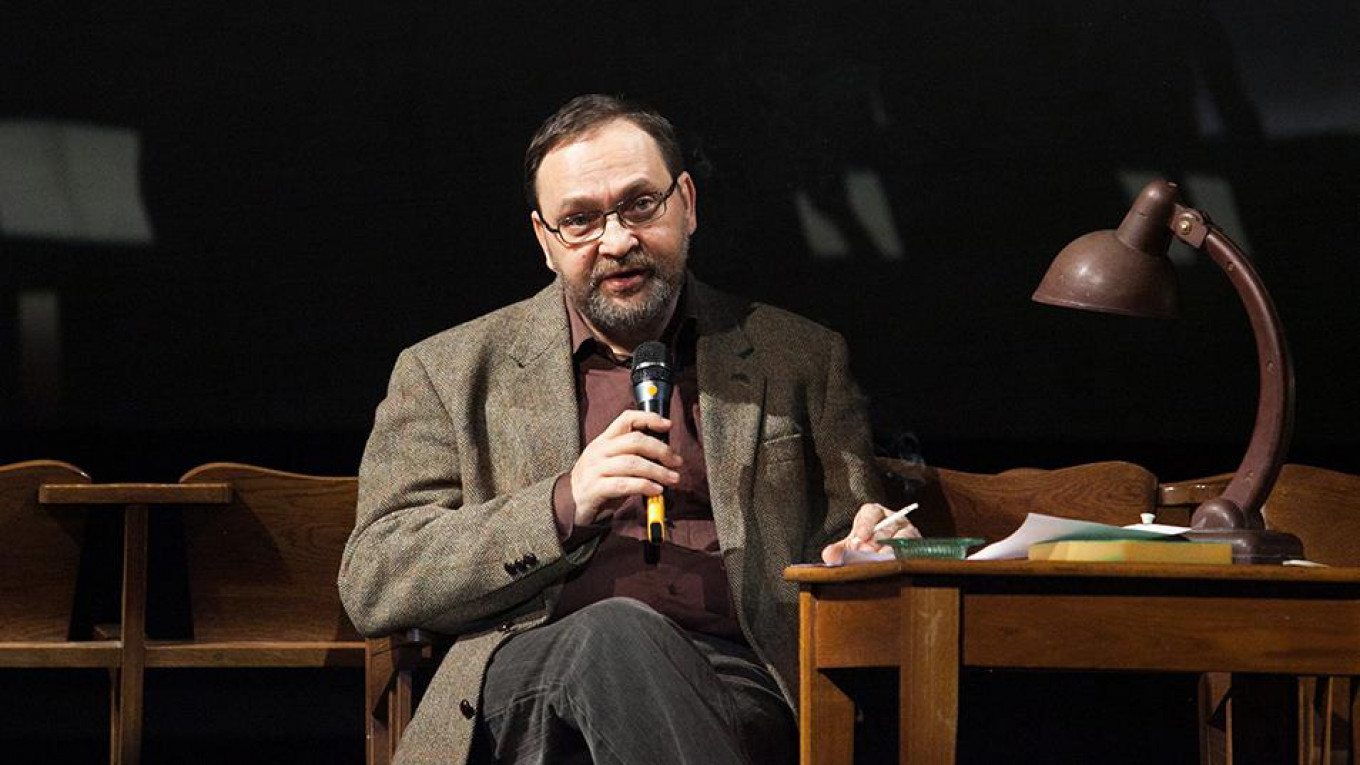Mikhail Ugarov, one of the biggest names in the world of Moscow independent theater, unexpectedly died of a heart attack on Sunday at the age of 62. A playwright and director, Ugarov was best known as the founder of one of the most popular and politically controversial theaters in the city, Teatr.doc, which literally means “documentary theater.”
Born in Arkhangelsk, he studied at the Gorky Literature Institute in Moscow, but quit it at some point and never graduated. In the 1990s he combined working at TV and writing plays. At one point he co-wrote a screenplay for a TV series directed by Kirill Serebrennikov, embattled artistic director of Gogol Center, who's been under house arrest for the past several months. Ugarov has been a champion for Serebrennikov's release from day one.
Ugarov was one of the founders of the “New Drama” theater movement and for several years was in charge of Lubimovka festival, named after the famous Soviet-Russian theater director Yury Lubimov. Lubimovka's objective is to find and support new talented playwrights. John Freedman, who’d been The Moscow Times’ theater critic for many years, wrote about Ugarov on Facebook that “he was a mentor to hundreds of playwrights. He championed writers, he urged them on, he staged them, he produced them, he taught them, he encouraged them, he goaded them, he inspired them.”
In 2002, Ugarov founded Teatr.doc together with his wife, Yelena Gremina. Gradually Teatr.doc turned into a proper theater, with seasonal premieres and long-running productions. It became Ugarov's life work. Always timely, Teatr.doc's performances ranged from biting political satire, like “BerlusPutin”, where Putin's and Berlusconi's brains merge, to true documentary theater, like “War is Near”, based on the real diary of a Luhansk resident written during the conflict in East Ukraine.
Natalia Antonova, an American playwright and journalist, told The Moscow Times that “as an artist, Mikhail Ugarov went against the idea that theater should be pleasing and ornamental. He fought government censorship and was a proponent of radical honesty — and yet he lacked the alienating self-righteousness that tends to come with such a difficult role. He united an entire artistic community, a movement, both in Moscow and far beyond Moscow, and those of us who were and are part of what he built feel orphaned and unmoored now.”
In 2014, Teatr.doc was forced to move out of the building near Pushkin Square, which it rented since its founding: the Moscow authorities decided to break the lease. If someone thought that would shut up Teatr.doc, they were mistaken. Teatr.doc quickly found a new home in one of the side streets near the Kurskaya metro station and has been performing there ever since.
“The Man from Podolsk” turned out to be the last production that Ugarov directed. One of the most notable premieres of 2017, it's not what it seems at first glance. Based on a play by Dmitry Danilov, it starts out as a story of police abuse when the titular “man from Podolsk,” a Moscow suburb, gets arrested without any grounds.
But then comes an unexpected twist: the play takes place in an alternate reality, where the police are primarily concerned with the intellectual development of the citizens. Despite the plot's seeming absurdity, it's a poignant statement about today's Russia, one that Ugarov was unafraid to deliver despite the censorship.
Yury Muravitsky, who's directed several productions at Teatr.doc, notes that “Mikhail knew how to trust. It's a very rare quality. Without trust it is very difficult to work. And he could trust and was not afraid to trust people. I believe he didn't fear anything at all. And this is what we all need to learn from him.”
A Message from The Moscow Times:
Dear readers,
We are facing unprecedented challenges. Russia's Prosecutor General's Office has designated The Moscow Times as an "undesirable" organization, criminalizing our work and putting our staff at risk of prosecution. This follows our earlier unjust labeling as a "foreign agent."
These actions are direct attempts to silence independent journalism in Russia. The authorities claim our work "discredits the decisions of the Russian leadership." We see things differently: we strive to provide accurate, unbiased reporting on Russia.
We, the journalists of The Moscow Times, refuse to be silenced. But to continue our work, we need your help.
Your support, no matter how small, makes a world of difference. If you can, please support us monthly starting from just $2. It's quick to set up, and every contribution makes a significant impact.
By supporting The Moscow Times, you're defending open, independent journalism in the face of repression. Thank you for standing with us.
Remind me later.






